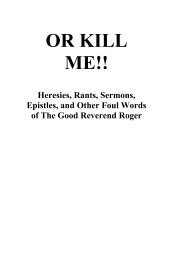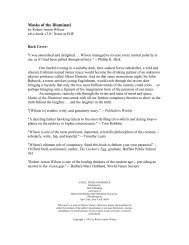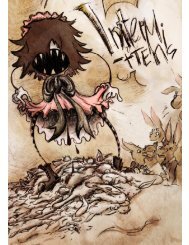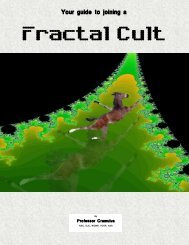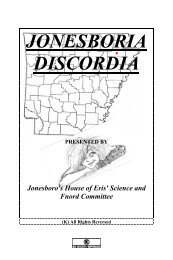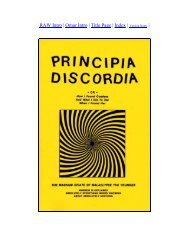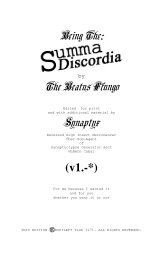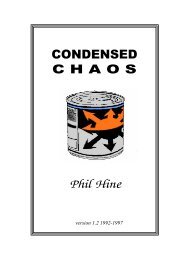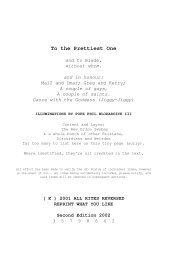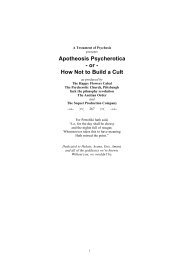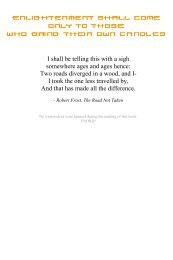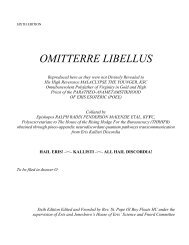Coincidance - Principia Discordia
Coincidance - Principia Discordia
Coincidance - Principia Discordia
Create successful ePaper yourself
Turn your PDF publications into a flip-book with our unique Google optimized e-Paper software.
8 COINCIDANCE<br />
Lefanu's novel is coincidentally linked to Joyce's by the earwig theme, the<br />
Chapelizod-Phoenix Park locale and the resurrection motif.<br />
Hyacinth O'Flaherty has another link with the resurrection theme; one<br />
of the hundreds of dead-and-resurrected gods discussed in Frazer's classic<br />
Golden Bough was named Hyacinth.<br />
But "Hyacinth" was also the code-name for Lord Alfred Douglas in a<br />
homosexual poem by Dubliner Oscar Wilde; Earwicker's dream partially<br />
concerns repressed homosexuality. And the house by the churchyard in<br />
LeFanu's novel suggests Kierkegaard, whose name means "churchyard" in<br />
Danish. Kierkegaard was a compulsive masturbator and suffered chronic<br />
fears that this would lead to insanity. When the protagonist of FW is "on the<br />
edge of selfabyss" on page 40, this refers to both "self-abuse" (a nasty<br />
Victorian term for masturbation, which should more properly be called<br />
self-enjoyment) and Kirkegaard's favorite metaphor of the Abyss. But biss<br />
in German is to bite, and this brings us back to "agenbite of inwit," the<br />
medieval term for bad conscience which Stephen Dedalus uses to describe<br />
his own Catholic super-ego in Ulysses.<br />
Earwicker (whose full name is Humphrey Chimpden Earwicker, and<br />
whose initials appeared in Howth Castle and Environs, by the way) is not<br />
only a Dubliner but etymologically-punningly linked to the earliest Gaelic<br />
name of Dublin, Baile atha Cliath, which means town of the hurdles.<br />
Hurdles are wicker bridges. But the early Celts practised human sacrifice by<br />
burning prisoners of war in large wicker structures and, by a commodius<br />
vicus of recirculation, we seem to be close to the roots of Anglo-Saxon<br />
wicce, which means turning (like one of Vico's historical cycles) or dancing,<br />
and thus we also approach wicca-craft or witchcraft.<br />
In the course of the dream, H.C. Earwicker is repeatedly attacked by<br />
neighbors intent on lynching him for his (real or fantasized) sexual "sins."<br />
These nightmarish sequences always refer, through puns, to the ancient<br />
Celtic rituals of human sacrifice in wicker baskets. Thus, on the level of the<br />
Freudian unconscious (one meaning of Joyce's ), these sequences reflect<br />
personal sexual guilt, while on the level of the Jungian collective unconscious<br />
(Joyce's ), these are genetic memories of ancient Celtic religion. That<br />
wicker is etymologically related to manger (see your etymological dictionary)<br />
links Earwicker to Christ, who"died for our sins"—the best known scapegoatgod<br />
in our Western civilization. It is moderately curious that the anthropological<br />
link between Christ and the ancient Celtic human sacrifice is the theme<br />
of a film, made nearly 30 years after Finnegans Wake was published, called The<br />
Wicker Man,<br />
Earwig in French is perse-orielle. Joyce sometimes calls Earwicker Pearse<br />
O'Reilly, punning on this, but Pearse and O'Reilly were two of the Irishmen



